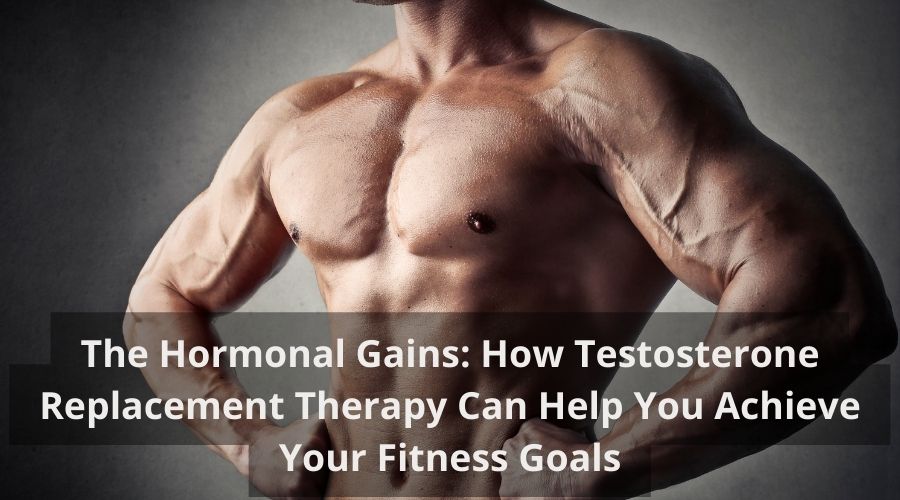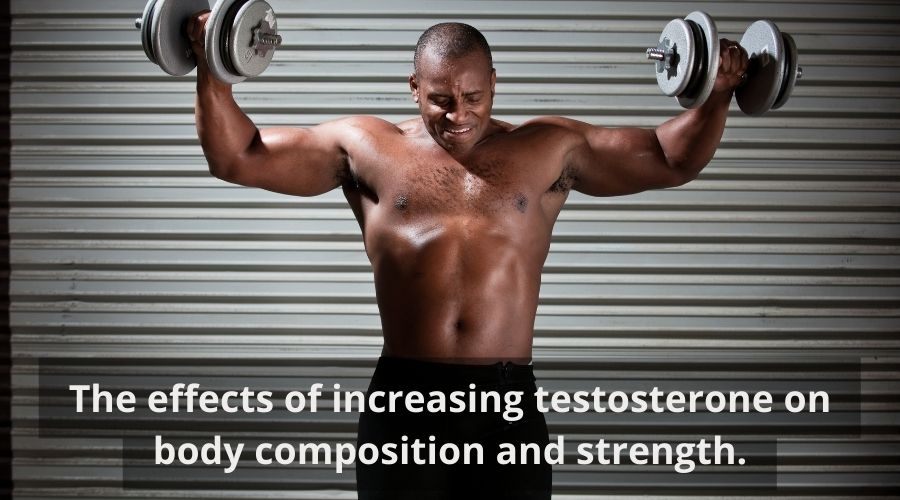
The Hormonal Gains: How Testosterone Replacement Therapy Can Help You Achieve Your Fitness Goals
How testosterone replacement therapy can help you achieve your fitness goals.
If you’re having problems reaching your fitness goals, testosterone replacement therapy could be the answer.
If you’re looking to get more out of your workouts, testosterone replacement therapy may be the way to go. Testosterone is responsible for helping men develop muscles and increase their endurance. It can also help improve mood and energy levels. Testosterone replacement therapy can help you achieve all of these benefits, while also helping to prevent age-related declines in muscle mass and bone density. If you’re interested in getting more out of your workouts, talk to your doctor about whether testosterone replacement therapy is right for you.
Can testosterone replacement therapy help you become more physically fit?
Can testosterone replacement therapy help you become more physically fit? Recent studies have shown that testosterone replacement therapy can improve your physical fitness and overall health. Testosterone is responsible for making muscles stronger and helping you burn calories. Additionally, testosterone replacement therapy can improve your bone density, protect your heart health, and even decrease the risk of developing type 2 diabetes. If you are looking to increase your fitness levels or just want to maintain your current levels of physical activity, testosterone replacement therapy may be a good option for you.
How does testosterone replacement therapy impact your mood and mental health?
Effects of testosterone replacement therapy on mood and mental health have been widely studied, but the results are inconclusive. Some studies have shown that testosterone replacement therapy can improve mood and mental health, while other studies have found no significant impact. The inconsistency of the results may be due to a variety of factors, including the type of testosterone therapy used, the sample size, and the duration of treatment. More research is needed to understand the long-term effects of testosterone replacement therapy on mood and mental health.
Can understanding how testosterone works help you achieve your fitness goals?
As testosterone levels in men decline with age, many people wonder what they can do to maintain or even improve their levels of the hormone. Understanding how testosterone works can help you achieve your fitness goals. Testosterone is responsible for male reproductive functions as well as muscle growth and metabolism. The hormone is secreted by the testicles, and it is important for maintaining a healthy balance in your body. Too much testosterone can lead to gynecomastia (a condition where there are excess breast tissue), prostate enlargement, and other health problems. However, too little testosterone can also have negative impacts on your health, including loss of libido, poor moods, fatigue, and a decrease in muscle mass. By understanding how testosterone works and taking steps to optimize your level of the hormone, you can enjoy healthier physical and emotional outcomes.

The effects of increasing testosterone on body composition and strength.
Effects of testosterone on body composition.
Effects of testosterone on body composition are still being studied, but there are indications that testosterone may play a role in the regulation of muscle mass and the deposition of fat. It is also possible that testosterone affects the development and function of adipose tissue. While much remains to be learned about the effects of testosterone on body composition, these preliminary findings suggest that testosterone may play an important role in regulating body weight.
The role of testosterone in strength and endurance training.
Testosterone is an androgen hormone that is secreted by the testes in men and women. Testosterone plays a significant role in muscle strength, mass, and endurance. In men, testosterone levels are highest during adolescence and decline with age. Testosterone has been shown to have positive effects on muscle strength and mass in both men and women. In addition, testosterone has been shown to increase fat loss rates in both sexes.
How to increase testosterone levels naturally?
There are many ways to increase testosterone levels naturally. Some include lifestyle changes, dietary supplements, and physical activity. Many people find that taking a natural supplement such as Tribulus terrestris can help them increase their testosterone levels. There are also many lifestyle changes you can make to help boost your testosterone levels. These include eating healthy foods, getting enough sleep, and avoiding stress. All of these things can help improve your overall health and libido.
The impact of testosterone on body composition and strength.
The impact of testosterone on body composition and strength is an area of growing interest in sport. Testosterone has been shown to be associated with muscle mass, bone density and strength (1). The relationship between testosterone and body composition is complex, but appears to involve both muscle protein synthesis (MPS) and breakdown (2, 3). In general, testosterone levels are positively associated with muscle mass and strength in men, although the relationship is less clear in women (4). There are a number of possible explanations for this discrepancy. One possibility is that the sex hormones have different effects on muscle protein synthesis and breakdown in men and women. Another possibility is that sex hormones have different effects on different types of muscles. For example, testosterone may have a stronger positive effect on type IIb muscle fibers than type I fibers.
The benefits of testosterone replacement therapy for men.
Despite being hailed as a panacea for everything from obesity to low libido, testosterone replacement therapy (TRT) is not without its detractors. Some argue that TRT is nothing more than a placebo, while others maintain that the benefits of TRT are overstated. Here are six reasons why men might want to consider testosterone replacement therapy:
1. Increased Strength and Endurance.
One of the most commonly reported benefits of testosterone replacement therapy is increased strength and endurance. This is likely due to the fact that testosterone levels naturally decline with age, leading to decreased muscle mass and reduced energy levels. Testosterone replacement therapy can help address these issues by increasing muscle mass and energy levels, which can lead to improvements in overall performance.
2. Improved Libido and Sexual Functioning.
Another common benefit of testosterone replacement therapy is improved libido and sexual functioning.
The potential dangers associated with over-the-counter testosterone supplements
The use of testosterone supplements has skyrocketed in recent years, with many people thinking they can help them achieve their bodybuilding or athletics goals. However, there are a number of potential dangers associated with this trend, including heart attack and stroke. In addition to these serious health risks, testosterone supplements can also cause hair loss, acne, and other problems. If you’re considering using one of these products, make sure to talk to your doctor first to see if it’s safe for you.
What lifestyle changes you can make to improve your testosterone level despite high levels naturally occurring in the male body?
How to improve testosterone levels naturally:
There are a number of ways to naturally improve testosterone levels. Here are 8 tips:
1. Eat a balanced diet that includes plenty of fruits and vegetables. These foods contain antioxidants, which can help increase testosterone production.
2. Get enough exercise. Exercise can increase the production of endogenous testosterone and reduce stress levels, both of which can play a role in boosting testosterone levels.
3. Avoid smoking and drinking alcohol excessively. Both substances have been linked with reductions in testosterone levels.
4. Take supplements that are designed to Increase testosterone production such as ashwagandha or tribulus terrestris extract capsules. However, make sure to speak with a doctor before taking any supplement as some may have side effects that you may not want to experience.
5 Take measures to improve sleep quality by practicing relaxation techniques such as meditation or deep breathing exercises before bedtime.
Eat a greater variety of plant-based foods.
A diet that includes a greater variety of plant-based foods can help support testosterone production. In fact, research suggests that eating a plant-based diet can increase testosterone levels by up to 40 percent! This is because plant-based foods contain healthy fats and nutrients that are important for testosterone production. Additionally, including more variety in your diet will help keep you fuller longer and provide you with more nutrient dense options. So why not try out some of our favorite recipes today?
Invest in supplements that boost testosterone levels naturally.
According to the National Academy of Sciences, testosterone levels in men decline with age. Testosterone replacement therapy (TRT) can help counter this trend and improve overall health. However, there are a lot of different options for TRT, and some people may not be able to take supplements to boost testosterone levels naturally. Here are a few natural options that have been shown to increase testosterone levels:
eating healthy foods that contain high-quality protein and fiber, including soy products;
consuming adequate amounts of zinc;
taking herbs such as tribulus terrestris or ashwagandha;
participating in physical activity regularly.
Get regular exercise to help increase testosterone production.
Regular exercise can help increase testosterone production. Exercise has been proven to be beneficial for overall health and has been shown to improve moods and sexual function in men. The American College of Sports Medicine recommends at least 150 minutes of moderate-intensity exercise per week for optimal testosterone production.